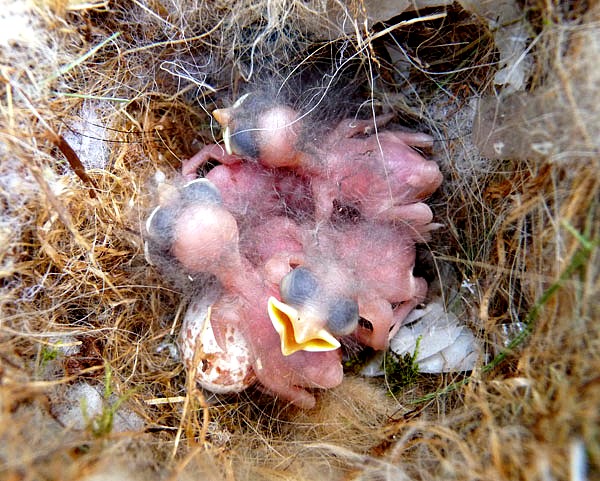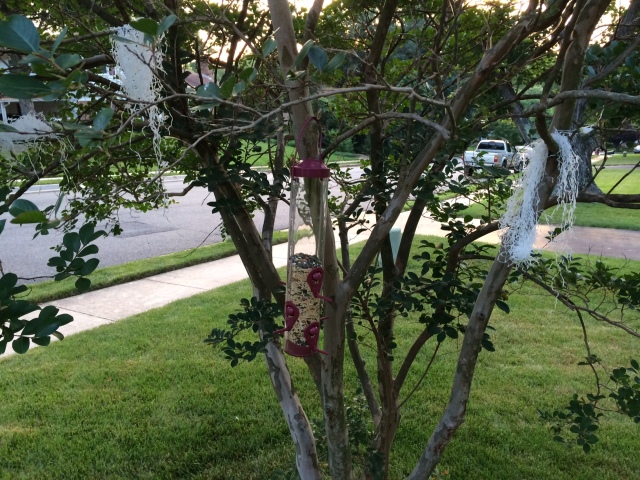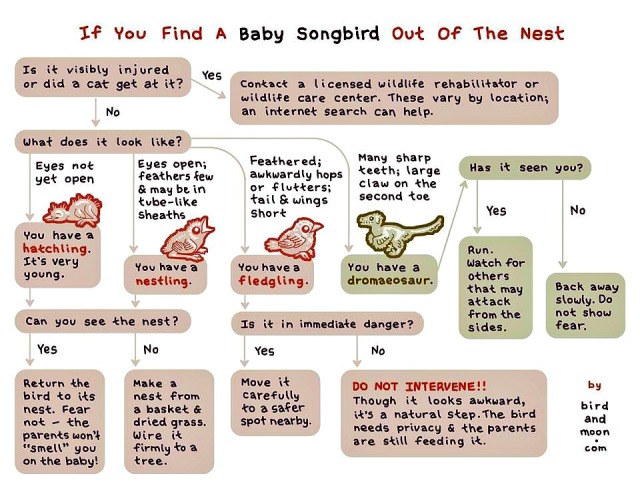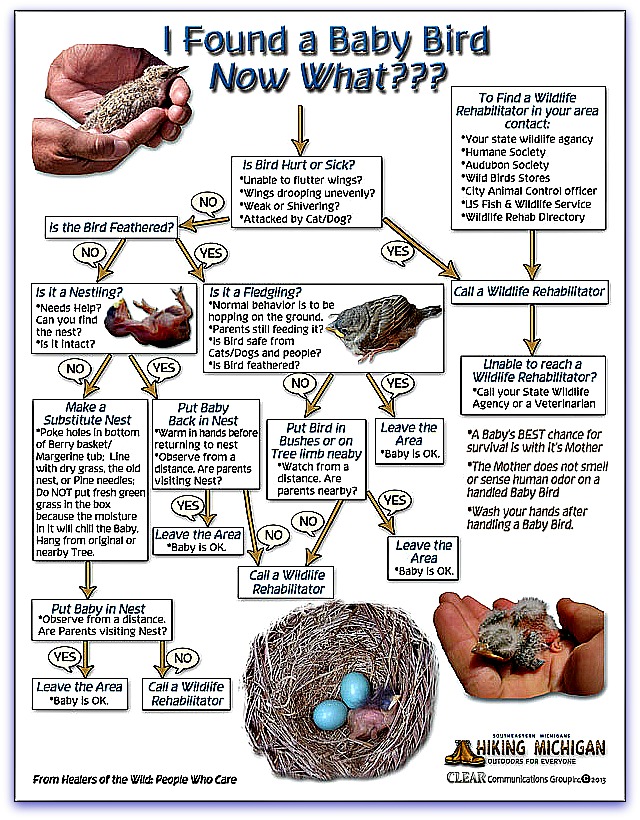Life is as dear to a mute creature as it is to man. Just as one wants happiness and fears pain, just as one wants to live and not die, so do other creatures. – His Holiness The Dalai Lama
 We recently moved into a new home. As with most moves, there are circumstances that you cannot control, and we have had our share this move. Our landlord has been building on an addition to the house since before we moved in, and the construction still continues. During all of the banging and vibrations, we discovered an active bird’s nest in the exterior wall. We had been monitoring the nest for weeks, but this weekend we heard the wee cries of new hatchlings!
We recently moved into a new home. As with most moves, there are circumstances that you cannot control, and we have had our share this move. Our landlord has been building on an addition to the house since before we moved in, and the construction still continues. During all of the banging and vibrations, we discovered an active bird’s nest in the exterior wall. We had been monitoring the nest for weeks, but this weekend we heard the wee cries of new hatchlings!
As exciting as this was, we knew that we had to make a decision quickly because the construction crew was scheduled to come the next day to seal up the exterior wall with insulation and drywall. The nest was going to be sealed in there with live baby birds! We put our heads together, identified the bird species, did some bird fact checking, and came up with the best solution for this species … We relocated the nest.
NOTE: Nesting songbirds are protected by federal law, which prohibits moving their nests!
In the United States it’s illegal to remove or destroy any active nest from any native bird species. An active nest is defined as “a nest with eggs or brooding adults in it”. If the nest has been abandoned or no eggs have yet been laid, it can be removed or destroyed as needed.
House Sparrows (Passer domesticus) and European starlings, are not native birds. This is how we knew that it was legal to relocate the nest.
The images below show how we did it. I am sharing this to help others if they encounter a similar situation with native or nonnative bird species.
If you click on/scroll over the images above, you can see how and what we were doing. Please note that this entire process happened very quickly, to reduce the amount of stress on the parents and the offspring. After we moved the baby birds to the new nest area, we c l e a r e d ourselves out of the area, to allow the parents to feel safe enough to explore the area and listen for their offspring.
As we had hoped, Mother Nature and the maternal and paternal instincts saved the day! Just hours later, the cries of the hatchlings were heard and the parents found their offspring! The mother and father are now guarding their recently relocated nest.

The next day we bought a bird feeder and offer them seed they prefer.
We found a very sturdy double seed bird feeder at Lowe’s for $5! I set it up in a tree that I often see the parents hanging out in. I also added some biodegradable nesting material; they have been using it already! yay!
If you have found this article while searching for help on ‘how to move a bird’s nest’, or ‘how to help a baby bird’ it’s very important that you correctly identify the species of bird (by watching the adult birds at the nest), before you even consider interfering with the nest! You must determine whether or not the nest removal would be legal according to local wildlife laws. Native birds are protected species, so tampering with a nest could lead to hefty fines or other penalties.

Nests You Shouldn’t Remove
- Endangered birds that are unlikely to build a new nest if disturbed
- Raptors or other large birds that will reuse the same nest for many years
- Natural cavities that would be destroyed in order to remove the nest
- Any nest in early summer that may be reused for additional broods
- Learn more about rules regarding Relocating Nesting Birds
Bird Nest Facts:
- Birds usually lay one egg a day.
- They don’t begin incubating their eggs until all the eggs have been laid.
- Clutch sizes vary from 2 to 8 eggs for most common backyard birds.
- Once the last egg has been laid, incubation takes about two weeks.
- The eggs will usually hatch about the same time.
- After hatching, it will take another two weeks before the nestlings are ready to leave the nest.
- To be on the safe side, and to allow for variety in species, allow six weeks before the nest is ready to be moved.
- Learn more about incubation and fledging time for common bird species in North America.
- Common questions about Baby Birds
What About Touching The Babies?!?
You’re probably familiar with the “rule” that many of us were taught as children: never touch baby birds, or the mother bird will reject her own offspring. Unfortunately, it’s still generally believed that the mere scent of a human on a hatchling or fledgling bird will spook the mother bird into abandoning her offspring. Good thing this misperception is FALSE! This lore may have been invented for keeping children away from birds, in order to ensure the bird’s safety. Also, the parents of the baby bird may be nearby, and could become protective and aggressive when they see children near their nest; parents could have been protecting their human offspring with this tall tale. In fact, birds have a limited sense of smell and even if the mama bird could smell your scent, this would not interfere with taking care of her offspring. However, if you disturb the eggs in a nest, the mother and father birds could understand that they are facing a danger, and may abandon the nest completely. So please give nesting birds the space they need!

Mother birds will not reject their babies because they smell human scent on them, nor will they refuse to set on eggs that have been handled by a person. Most birds have a limited sense of smell and cannot detect human scent. (If you handle bird eggs while the mother is away from the nest, mama bird will usually notice upon her return that the eggs were disturbed during her absence, and some species of bird will take this as an indication that a dangerous intruder is present and may temporarily or even permanently abandon their nests as a result. Such behavior is relatively rare, however, and in these situations the mother birds are reacting to visual warnings, not olfactory ones.)
Learn the Truth Behind More BIRD MYTHS AND MISCONCEPTIONS!
So what should you do if you find a baby bird out of the nest? These graphics should help you!
Learn more about What To Do If You Find A Baby Bird
If you have men who will exclude any of God’s creatures from the shelter of compassion and pity, you will have men who will deal likewise with their fellow men. – St. Francis of Assisi
Sources:
http://www.worldbirdsanctuary.org/index.php http://www.allaboutbirds.org/ http://bna.birds.cornell.edu/bna











Found a nest of eggs not hatched (Cream colored with brown speckles). Looked this picture of eggs up and identified them as Sterling. The problem is its in my golf cart ;). I’m afraid it will kill or injury the eggs/hatchlings. The golf card on completely smooth roads might be okay but, I don’t travel on completely smooth roads. Our park (up to 3 miles around) has bumps and pot holes. I need to move the nest with the eggs in it.
LikeLike
I have a similar problem to that of Renee. We found an active nest with several eggs in it, in a Christmas tree stand in our garage! Could I move the whole thing out of the garage to a safe place? Will momma bird find it easily? I don’t want to do anything to injure the eggs or upset momma bird -buried course our garage door needs to close sometimes. It’s amazing to me that a bird could even nest in there, considering we always close it at night and a lot during the day. Very fascinating.
LikeLike